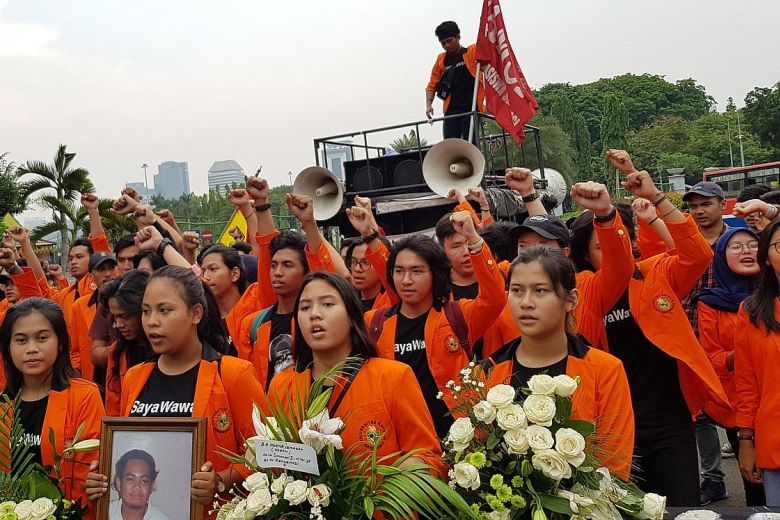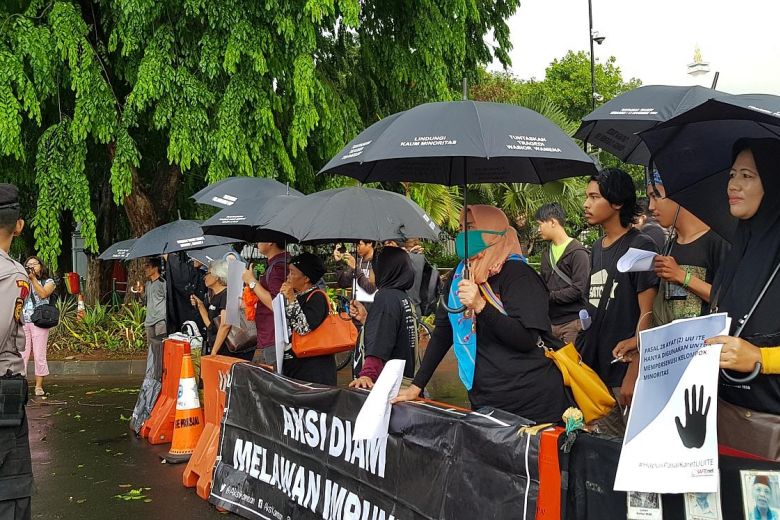Student activists from Atma Jaya University demonstrating in front of the presidential palace in Jakarta during a protest last month to mark the 20th anniversary of the Semanggi I shooting. Dozens were killed in that incident, as well as in two others – called Semanggi II and Trisakti Tragedies – as they fought for the decreasing role of the military in business and politics after Suharto’s ouster. ST PHOTO: LINDA YULISMAN
Dozens stage weekly protests in Jakarta demanding action over shootings and other crimes by the military
Linda Yulisman Indonesia Correspondent In Jakarta
Every Thursday for more than 560 weeks, Ms Maria Katarina Sumarsih, clad in black and holding a black umbrella, has stood in front of the presidential palace in Jakarta.
Refusing to be silent, the 68-year-old mother has consistently sought justice for her first child, student activist Bernardinus Realino Norma Irmawan, who was shot on Nov 13, 20 years ago, during Indonesia’s transition from an authoritarian regime to the world’s third-largest democracy.
In the period since the fall of Indonesia’s strongman Suharto, a time also known as Reformasi, several leaders have failed to meet the demands in Ms Sumarsih’s petition to bring the murderer of Wawan, as he was called, to court.
Families of human rights abuse victims holding their weekly protest in front of the presidential palace in Jakarta on Nov 22. The gathering has been held every Thursday since Jan 18, 2007.ST PHOTO: LINDA YULISMAN
They include reform-minded President Joko Widodo, who has yet to take concrete steps to address past human rights abuses even as his five-year term is nearing its end. These abuses include the shooting by a soldier that claimed the life of Wawan, according to activists.
Wawan, an Atma Jaya University law student, was among dozens killed in a series of incidents in 1998 and 1999, called Semanggi I, Semanggi II and Trisakti Tragedies, as they fought for the decreasing role of the military in business and politics, following Suharto’s ouster.
When no moves were forthcoming to bring the killers to justice, Ms Sumarsih and activists in the Commission for Missing Persons and Victims of Violence and the Humanitarian Volunteer Network initiated, on Jan 18, 2007, the weekly gathering in front of the presidential palace. A few people attended the first gathering. Now, dozens, including families of victims and students, turn up.
Through these protests, popularly known as Aksi Diam Kamisan (Thursday Silent Protest), they have demanded that the government solve past human rights violations perpetrated by the military, including the rapes, lootings and burning of buildings during the May 12-15, 1998 riots, 1998-1999 student shootings, and mass killings of 1965.
The gathering was inspired by Argentina’s Mothers of Plaza de Mayo, a group of mothers who began a weekly march in 1977 to protest against the military dictatorship under whose rule their children had disappeared.
On the day her son was killed, Ms Sumarsih had warned him to stay away from the student protests outside Parliament. As an employee at the House of Representatives, she had heard from her colleagues that soldiers and armed militia guarding Parliament had been permitted to shoot the protesters. But in the hospital later that day, she cried over his dead body, with a hole in his chest.
“I can’t accept he was shot,” Ms Sumarsih told The Straits Times. “I feel the anger until now.”
The mother of two had pinned high hopes on Mr Joko, a non-military leader. In his campaign before his election in 2014, he had promised to solve past human rights cases, including the Semanggi I shooting, and end the impunity under previous administrations.
But, “in the midst of his tenure, Jokowi appointed a suspected perpetrator of human rights violations as the coordinating minister for political, legal and security affairs”, she said, referring to Mr Wiranto, the former defence minister and commander of Indonesian Armed Forces from 1998 to 1999. “It means he is pro-human rights criminals.”
The Suharto-era general was the man in charge while atrocities were carried out by the military in East Timor during its vote for independence in 1999, according to a 2003 indictment by the United Nations.
The Thursday gatherings have also been a protest channel for Mr Asih Widodo, who lost his only child Sigit Prasetyo during the Semanggi I shooting.
He has found solace in being with the families of other victims, even as countless meetings with lawmakers and justice apparatus from the State Court to the Constitutional Court have been to no avail, with the absence of legal proceedings against the perpetrator who took the life of his son, a civil engineering freshman at the University of Persada Indonesia YAI. Mr Asih said his anger over the state’s inaction outweighs his sorrow over losing his child.
At a recent gathering, the 67-year-old rode a motorbike with a written board above the headlight stating that his son was killed by the military. He has also travelled on his bike to other parts of the country, such as Central Java and East Java, blaring loud music to attract attention to his personal battle for justice.
“I am always optimistic. Before I die, I will keep seeking justice,” said Mr Asih.
The investigation into the three incidents by the National Commission on Human Rights (Komnas HAM) in 2002 found they were gross human rights violations, involving “murders, torture and forced disappearance”. But since then, the Attorney-General’s Office has yet to follow up with its own probes.
Early last year, the government decided to solve the cases through a non-judicial settlement – reconciliation without legal process or proceedings – a measure strongly rejected by families of the victims. They prefer having an ad hoc human rights tribunal that can clarify who the perpetrators of the human rights abuses were.
But settling the case through the courts is still feasible, said Komnas HAM chairman Ahmad Taufan Damanik. “It all depends on the President now. If he is firm, the chance is bigger” to solve the cases by way of a judicial measure, Mr Ahmad said, noting that Mr Joko has the power to order a probe by the Attorney-General.
Political shocks caused by bringing high-profile military figures into court trials should not be feared as the country has done so in the past, he added.
Nevertheless, Amnesty International Indonesia executive director Usman Hamid questioned the track record of Mr Joko’s administration in addressing past human rights abuses. “There has been a discourse to make the victims (of Semanggi I, Semanggi II and Trisakti Tragedies) heroes, but it has not been executed,” said Mr Usman, a student activist back in the late 1990s.
Ms Sumarsih also sees the appointment of senior generals to strategic posts in Mr Joko’s administration as a reconsolidation of the New Order power – the power of the authoritarian regime under Suharto – which her son and other activists fought hard to dismantle, at the sacrifice of their own lives.
She said she would continue to stand outside the palace for many more Thursdays, and become a constant reminder lest anyone forget.
“Death cannot break a love relation. Because I love Wawan and I know what he was doing at that time, I want to continue his unfinished struggle,” Ms Sumarsih said. “I want to see the supremacy of law as the Reformasi agenda upheld.”
And 12 years on, many young people, especially university students, are joining the weekly Thursday gatherings.
“I don’t want my friends to have the same fate as Wawan, who was shot dead without a clear reason,” said Atma Jaya University third-year law student Vebrina Monicha. “The best solution to this case is to hold trials for the mastermind of the incident.”
Correction note: The story has been edited to correct the quote by Ms Maria Katarina Sumarsih which should read, “It means he is pro-human rights criminals.” We are sorry for the error.


